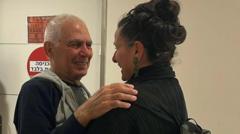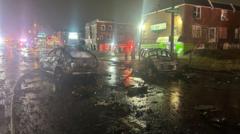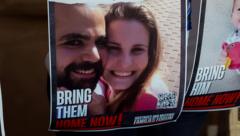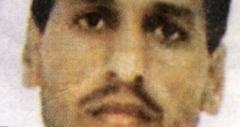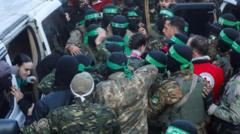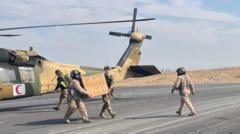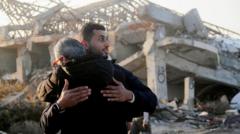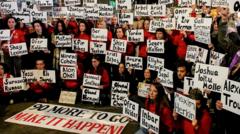The latest Israeli air strike in Lebanon has devastated emergency response teams, sparking international calls for ceasefire and humanitarian support.
Israeli Airstrike Claims Lives of 15 Rescue Workers in Lebanon
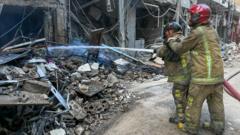
Israeli Airstrike Claims Lives of 15 Rescue Workers in Lebanon
Tragic escalation in conflict results in significant casualties among emergency responders.
At least 15 rescue workers were killed on Thursday in an Israeli air strike targeting an emergency response centre in north-eastern Lebanon, marking one of the deadliest assaults on Lebanese emergency personnel amid the ongoing conflict. The attack, which occurred in Douris near the city of Baalbek, obliterated a facility operated by the civil defence agency, an organization aligned with the Lebanese government and unlinked to Hezbollah.
Regional authorities, including Governor Bachir Khodr, confirmed that among those who lost their lives was the local civil defence chief, Bilal Raad. The Israeli military has yet to respond to the incident, which the Lebanese health ministry condemned as “barbaric.” The Lebanese civil defence agency is responsible for crucial emergency operations such as search and rescue missions and firefighting efforts.
In a parallel incident that same day, another Israeli air strike destroyed a civil defence centre in Arab Salim, situated in the southern Nabatieh region, resulting in the deaths of six individuals, five of whom were paramedics. The Lebanese health ministry reports that a staggering total of nearly 200 emergency and health workers have died in Israeli airstrikes since the conflict with Hezbollah escalated in September.
These air strikes come during a time of intensified Israeli military actions aimed primarily at Hezbollah positions. Notably, strikes in Beirut's southern suburbs have persisted for four days consecutively, coinciding with evacuation directives issued by the Israel Defense Forces (IDF), which claims to be targeting crucial infrastructure associated with the group.
Internationally, there are renewed discussions regarding a ceasefire, with U.S. officials providing the Lebanese government with a preliminary proposal for peace negotiations. The Lebanese government insists that any potential agreement adhere to United Nations Resolution 1701, which originally concluded hostilities between Hezbollah and Israel in 2006. This resolution stipulates the removal of Hezbollah fighters and weapons from areas adjacent to the border.
While a potential ceasefire deal is being considered, such an agreement could involve increased deployment of Lebanese army troops to the region, though specifics are still unknown. Israel has signaled its demand for the right to act within Lebanon in case of any violations of the agreement, a request that has faced resistance from both Hezbollah and Lebanese authorities.
Despite facing considerable setbacks due to the ongoing airstrikes, Hezbollah has demonstrated resilience and continues to engage in retaliatory actions against northern Israel. During a recent visit to Beirut by senior Iranian advisor Ali Larijani, Lebanese Prime Minister Najib Mikati asserted that reaching an unconditional ceasefire while fully implementing Resolution 1701 remains the government's foremost priority. Negotiations for a potential understanding are ongoing as concerns mount surrounding civilian safety and the humanitarian crisis triggered by the conflict.
Regional authorities, including Governor Bachir Khodr, confirmed that among those who lost their lives was the local civil defence chief, Bilal Raad. The Israeli military has yet to respond to the incident, which the Lebanese health ministry condemned as “barbaric.” The Lebanese civil defence agency is responsible for crucial emergency operations such as search and rescue missions and firefighting efforts.
In a parallel incident that same day, another Israeli air strike destroyed a civil defence centre in Arab Salim, situated in the southern Nabatieh region, resulting in the deaths of six individuals, five of whom were paramedics. The Lebanese health ministry reports that a staggering total of nearly 200 emergency and health workers have died in Israeli airstrikes since the conflict with Hezbollah escalated in September.
These air strikes come during a time of intensified Israeli military actions aimed primarily at Hezbollah positions. Notably, strikes in Beirut's southern suburbs have persisted for four days consecutively, coinciding with evacuation directives issued by the Israel Defense Forces (IDF), which claims to be targeting crucial infrastructure associated with the group.
Internationally, there are renewed discussions regarding a ceasefire, with U.S. officials providing the Lebanese government with a preliminary proposal for peace negotiations. The Lebanese government insists that any potential agreement adhere to United Nations Resolution 1701, which originally concluded hostilities between Hezbollah and Israel in 2006. This resolution stipulates the removal of Hezbollah fighters and weapons from areas adjacent to the border.
While a potential ceasefire deal is being considered, such an agreement could involve increased deployment of Lebanese army troops to the region, though specifics are still unknown. Israel has signaled its demand for the right to act within Lebanon in case of any violations of the agreement, a request that has faced resistance from both Hezbollah and Lebanese authorities.
Despite facing considerable setbacks due to the ongoing airstrikes, Hezbollah has demonstrated resilience and continues to engage in retaliatory actions against northern Israel. During a recent visit to Beirut by senior Iranian advisor Ali Larijani, Lebanese Prime Minister Najib Mikati asserted that reaching an unconditional ceasefire while fully implementing Resolution 1701 remains the government's foremost priority. Negotiations for a potential understanding are ongoing as concerns mount surrounding civilian safety and the humanitarian crisis triggered by the conflict.

